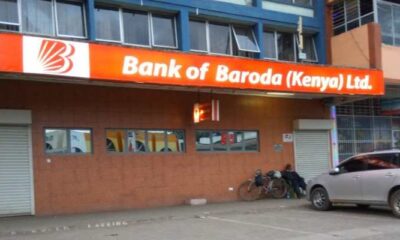The High Court has ordered the Bank of Baroda to pay Sh22 million in damages for the irregular sale of loan security, highlighting the importance of due diligence and fairness in banking practices. This ruling sets a precedent for legal compliance and ethical conduct in the treatment of loan security sales.
In a landmark ruling that underscores the importance of due diligence and fairness in the banking sector’s dealings with loan security, the High Court has ordered the Bank of Baroda to pay Sh22 million in damages to Mr. Guinbhash Sing Rayat and Rayat Trading Company Limited. The judgment, delivered by Justice Alfred Mabeya, casts a spotlight on the irregular sale of Rayat’s property, which had been secured as collateral for a loan. The property’s sale, conducted via private treaty for a sum lower than its market value, and without proper notification to Rayat, was found to be in violation of standard banking practices.
On September 4, 2007, Rayat Trading Company Limited made an application for a loan from tire-two Bank of Baroda.
Satisfied with Rayat’s application, the lender promptly approved three debt facilities, which included an overdraft of Sh5 million, a term loan of Sh10 million and a short-term advance of Sh2.7 million. The trio was secured by a legal charge on a parcel of land owned by Rayat.
All, however, did not go well for the trading company, which defaulted on payments, prompting the bank to sell the land it had deposited as collateral—triggering a suit that exposed missteps by Baroda that earned it a reprimand by the High Court, and an order to pay Rayat Sh22 million.
High Court judge Alfred Mabeya ruled that the sale of the property to Tetezi House Limited was irregular and Mr Guinbhash Sing Rayat deserved to be paid damages plus interest from the date of the judgement until the amount is settled in full.
“In the upshot, the court finds that the plaintiff has proved its case on a balance of probability and enters judgment accordingly,” the judge said.
Mr Rayat testified that the bank gave a facility which he was duly servicing and that he never received any notice demanding the balance or got a statutory notice for the sale of the building.
He only learnt of the sale of his property when three people visited his office.
Mr Rayat informed the court that he did a search and was informed that the property had been sold to the Tetezi House Limited and upon making an enquiry at the post office, he was informed that a letter sent to him, was returned to the sender because of non-collection.
The businessman, however, contended that the sale was fraudulently done with collusion between the bank and the new owner, as it was sold by private treaty as opposed to an auction. To make it worse, the property was disposed of at a lower value.
According to the businessman, in 2007, the property was valued at Sh21 million yet it was sold for only Sh17 million. On January 19, 2011, he was served with a notice to evict his tenants.
Mr Rayat maintained that he was never served with any demand for any outstanding money, the statutory notices, notice of redemption or even notice of sale from the auctioneer.
Bank of Baroda opposed the case stating that the businessman obtained overdraft facilities for Sh17.7 million, which were secured by the property.
The court heard that the company failed to discharge its obligations under the facilities and a demand for payment of the outstanding dues was served upon him as required by the law.
According to the lender, the property was sold under private treaty at the best market value.
It was the bank’s case that the equity of redemption was extinguished since there was a valid and binding agreement in favour of the new owner.
The lender also made a counter-claim against the company seeking an outstanding amount of Sh7.3 million, plus interest and general damages.
Mr Collins Ngetich, who testified on behalf of the bank said the company breached the credit facility contract and fell into arrears of Sh34.5 million inclusive of bank charges.
He submitted that the cumulative loan amount was Sh22.1 million which was offset by erroneous interest of Sh8.4 million and Rayat paid Sh803,951.60 leaving a balance of Sh7.3 million.
Mr Ngetich said Rayat’s failure to collect the notice from the Post Office box address was his own fault and could not invalidate the service.
Tetezi House through John Maina Mburu also opposed the case and made a counter-claim against Rayat.
The buyer wanted Rayat compelled to pay a monthly sum of Sh3 million from January 1, 2011 and to also bar him from collecting rent from the property. Mr Mburu said he visited the property and there was no protest on the planned disposal, after getting wind of the sale from an auctioneer who had been approached to advertise the property.
According to Mr Mburu, Rayat had been collecting rent of Sh 300,000 from the tenants, denying Tetezi House Ltd a chance to get its rightful income. In the decision, judge Mabeya wondered whether there was a valid statutory notice issued to Mr Rayat.
“The bank’s position was that it discharged its duty by sending the notice to the plaintiff’s registered post office box number. On his part, the plaintiff contended that since the notice was returned unclaimed, he cannot be said to have received the notice,” the judge observed.
However, the court stated that, once the notice was returned unclaimed, the lender should have made more effort to contact Mr Rayat.
“It was not enough to assume that since the notice had been issued, the bank’s obligation to serve the statutory notice was discharged. The bank should have done more than that. No attempt was made to effect service, for example, by personal service at the suit property,” the judge said.
Justice Mabeya said the evidence on record shows that Mr Rayat was oblivious that it had lost its property until he was confronted with eviction. The matter is compounded by the fact that the bank resorted for sale by private treaty rather than attempting public auction first, said the judge.
Justice Mabeya noted that Mr Rayat’s equity of redemption was extinguished once the property was sold to Tetezi House Ltd and the only remedy available for the former owner was damages.
“The amount suffered according to the plaintiff is Sh44,104,000. Considering the value of the property was Sh40 million and the amount due on the loan was Sh18 million. The damages awarded will be Sh22 million,” said the judge.
The court dismissed the bank’s counterclaim and directed Bank of Baroda to pay the costs of the suit.
Kenya Insights allows guest blogging, if you want to be published on Kenya’s most authoritative and accurate blog, have an expose, news TIPS, story angles, human interest stories, drop us an email on [email protected] or via Telegram

 Investigations7 days ago
Investigations7 days ago
 Grapevine2 weeks ago
Grapevine2 weeks ago
 Opinion2 weeks ago
Opinion2 weeks ago
 News2 weeks ago
News2 weeks ago
 Americas7 days ago
Americas7 days ago
 News1 week ago
News1 week ago
 Politics3 days ago
Politics3 days ago
 News6 days ago
News6 days ago

























